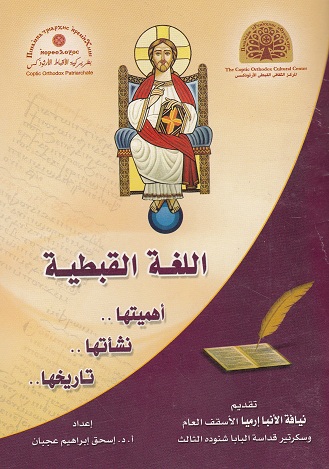No Result
View All Result
Among the series of the Coptic Orthodox Cultural Center Book issues
Recently issued: “The Coptic Language… Its Importance… Its Rising… Its History” book
Introduced by
Bishop Ermia
The General Bishop and Head of the Coptic Orthodox Cultural Center
Prepared by
Prof. Dr. Ishaq Ibrahim Agban
The Secretary General of the Institute of Coptic Studies, the Under Secretary of History Department at the Institute
September 2010
Foreword
Actually, our Egypt is in need of constructive words, rather than destructive ones, it needs words of building the Egyptian man, his character and culture. We are in need of words which build the bridges of love, expand the bridges of cultural, social, intellectual and patriotic communication, as His Holiness Pope Shenouda III said: “Egypt is not a country we live in, but rather a country that lives in us”.
We have assigned Professor Doctor Ishaq Ibrahim Agban, the Secretary General of the Institute of Coptic Studies and the Under Secretary of the History Department of the Institute, to prepare a research paper to be published on the Coptic language: its importance, its origin, its history, and to prepare two episodes of Nabd al Kanisa (Pulse of the Church) Program on the Coptic language. In response to what Dr. Youssef Zidan wrote in Al Masry al Youm Newspaper on 4/8/2010, issue number 2243 of the seventh year, as he wrote an article entitled “Arabic and Coptic in the Egyptian papyrus”, in which he said: “In fact, there is nothing called the Coptic language, but it is a myth that has been repeated in recent years until the poor ones really believed in it, In the third century B.C. this type of language called (Demotic), so it was arbitrarily called (Coptic), which is an insignificant name, because Coptic means Egyptian, and these are all Egyptian (Coptic) writing styles. This language or writing style appeared three centuries before Christianity, but many of us today believe that this (Coptic) language is the language of the Church. The funny is that some people speak this language in their homes, thinking that are as long as they believe in the true faith, they must speak this alleged language! They have been deceived by some clerics, who encouraged them on such act, hiding tha fact that it is a language of no connection to the religion. In fact, according to their terms, it is a pagan language that had appeared a long time before religion. If these novice religious people want to use a religious Christian language, they shall speak with each other with the Aramaic language (the Ancient Syriac) as it is the language which Lord Christ spoke. Aramaic (Syriac) is a language, Greek is a language, and Arabic is a language, while this alleged Coptic, is not a language at all, but is a writing style that the Egyptians (Pagans) resorted to after the Greek occupation of Egypt, and the stability Ptolemaic rule in it. It is a (fake) writing style consisting of twenty-four Greek letters and seven ancient Egyptian letters. In the middle of the fifth century AD, the Church men of Egypt were angry at the Greek (Melkites / Greek Orthodox) Church, so they decided to use the Coptic language in prayers and writing the religious scripts! So, people’s minds got assured about such illusion: This so called (Coptic language) is a religious language and with the repetition of such illusion, people believed in it.” The Doctor used words like: myth, illusion, Pharaoh… etc.
Dear readers: We express thanks to Dr. Ishaq Ibrahim Agban for this valuable research, in which he moves gradually among the importance of the Coptic language, how it is transformed from Demotic to Coptic, its origin, its propagation factors, and its relation to other languages, its dialects, literature, its use in translating the Holy Bible, the Coptic monasteries, the saints’ hagiographies, how the scholar Champollion employed it to decipher the ancient Egyptian language, the Coptic language in the modern times, and how Pope Shenouda III cared to preserve this language.
It is a much valuable beneficial research, in which Dr. Ishaq Ibrahim Agban briefed the satisfactory reply to what was published. May the Lord reward him for his effort and to benefit us with this book for the glory of His holy name, through the prayers of His Holiness Pope Shenouda III, may the Lord keep his life for several years and peaceful times.

No Result
View All Result










